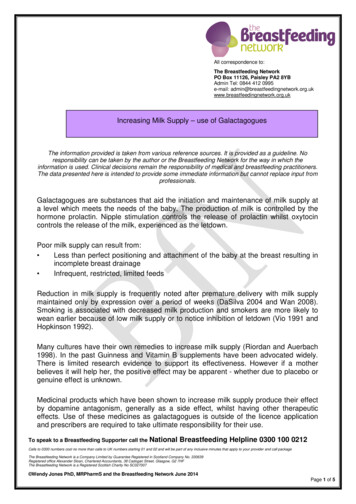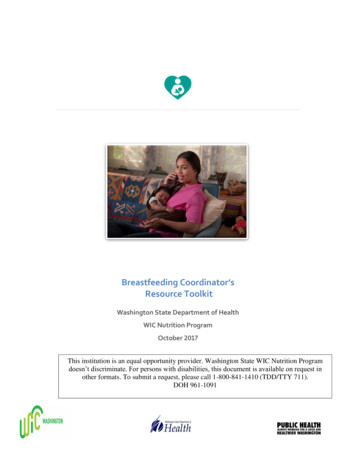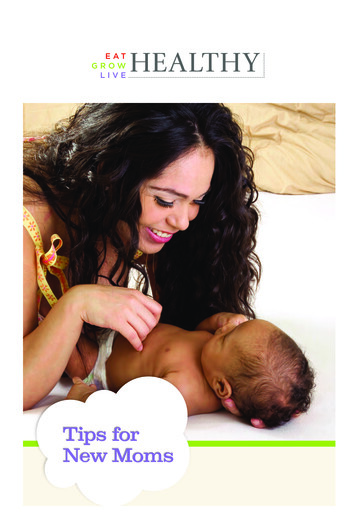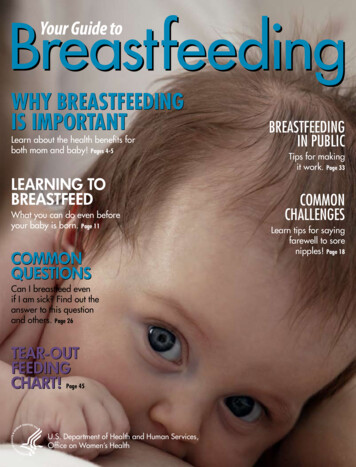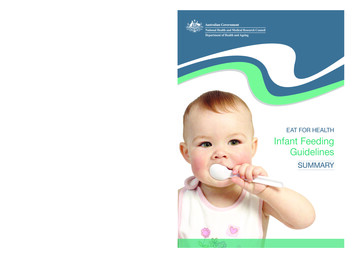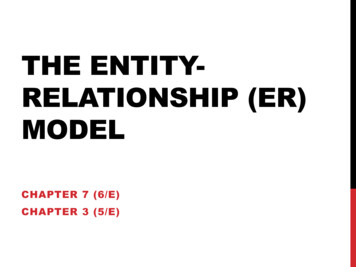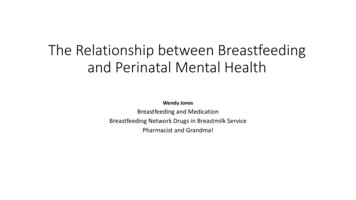
Transcription
The Relationship between Breastfeedingand Perinatal Mental HealthWendy JonesBreastfeeding and MedicationBreastfeeding Network Drugs in Breastmilk ServicePharmacist and Grandma!
Pain of breastfeeding and depression Breastfeeding experience rather than breastfeeding duration ispredictive of depressive symptoms in the postpartum period. breastfeeding should be straightforward so they had failed when it wasn’t mothers who stop breastfeeding due to pain or physical difficulties are atgreater risk of depressive symptomsUnderstanding the relationship between breastfeeding and postnatal depression: the role of pain andphysical difficulties Brown A 2015
Ante natal & Perinatal Mental health Pre-partum anxiety and depression, can lead to postpartum symptoms,and have an effect on breastfeeding cessation Inverse association between breastfeeding frequency and maternalanxiety level Breastfeeding cessation is also a cause of intensification of anxiety anddepressionThe Relation of Pre and Postnatal Depression and Anxiety with Exclusive Breastfeeding Sharifi 2016
Paternal depression 12% increased chance if Dad depressed mum delivers at 32-37 weeks Paternal depression: affect sperm quality has epigenetic effects on the DNA of the baby affects placenta function What about post traumatic birth and Dad?Prenatal parental depression and preterm birth: a national cohort study Liu 2016
Intention to Breastfeed and Depression Lowest risk of PPD was found among women who had planned tobreastfeed, and who had actually breastfed their babies Highest risk was found among women who had planned to breastfeedand had not gone on to breastfeedNew Evidence on Breastfeeding and Postpartum Depression: The Importance of Understanding Women’s Intentions Borra 2017
What does it feel like to have depression? Feel low, unhappy and tearful Irritable Tired Sleepless Appetite changes Unable to enjoy anything Loss of interest in sex Negative and guilty thoughtsHow do you feel if you don’t enjoy being with your baby?
Depression changes your thinking you might think that you are not a good mother or that your baby doesn't loveyou you may feel guilty for feeling like this everything is your fault you lose your confidence you think you can't copeImpact on breastfeeding from these negative thoughts?
AnxietyMental effect Worrying all the time Tired Being irritable Sleeping badly Struggling toconcentrate Lack of confidencePhysical effects Racing heartbeat Sweating Muscle tension Shaking Heavy breathing Dizziness Indigestion & diarrhoea.Then we add in breastfeeding?What about Breastfeeding and Medication?
What does it feel like to havebreastfeeding problems? Anxious Depressed Tired Under pressure A failure I’m useless I feel guilty WHY? Somebody help me Why is everyone sayingsomething different? I’m confused I’m exhausted
Breastfeeding means everything to somemumsI cant understand why I feel so desperately sad. It’s a deep grief, likeI want to die if I cant breastfeed any longer but my doctor doesn’tunderstand
When mental health can causeconflicts with breastfeeding ? Being told to take time for themselves and prioritise mental health overbreastfeeding Told to stop breastfeeding to take medication Judgemental attitudes to breastfeeding Concepts that mothers are being ‘drained’ Ignoring core beliefs about breastfeeding
But not everyone cares so much aboutbreastfeeding & that’s OK I’ve been prescribed but haven’t started the course of 50mg a day for28days. I’m concerned about the affects of the drug passing to my7month old through breastfeeding. I have read through the fact sheetand am still in two minds about continuing to breastfeed or switch toformula I know that virtually none passes over, but my concern is the long termaffect if any it could cause her
Influence of Big-Pharma?Dr. Robert J. Spitzerand colleagues from Columbia University developed thePHQ-9 in 1999 with a grant from Pfizer.
Good enough not inatal-matters
Guidelines supportive of breastfeeding? lack of sleep is a common precipitating factor. Mixedfeeding should be supported if this is the best way toprotect the mother’s wellbeing use of a pacifier for non-nutritive sucking benefits maybe advocated following consent from themother/parent. This may help with comforting the babyand has been linked to helping reduce the risk of cotdeath.www.londonneonatalnetwork.org.uk/wp content/uploads/2016/10/FinalNeodoc-v4.pdf
Breastfeeding and Medication Advice on breastfeeding can be complex - needs to take into accountfactors that include the effects of the medication on milk productionand breastfeeding. The mother may have both an intellectual and emotional response towhether she can or cannot breastfeed or whether she is able tosuccessfully breastfeed if she sets out to do so. Breastfeeding may have an effect on sleep and daily routine that maybe detrimental for a motherwww.londonneonatalnetwork.org.uk/wp content/uploads/2016/10/FinalNeodoc-v4.pdf
Useful comments?My doctor said there’s a risk of neurological damage to my son due to theaccumulation of citalopram; he backtracked a bit and said it was a smallrisk and the benefits outweighed the risk, but it’s a risk nonetheless.Is this something you can advise me on please? My anxiety centresaround my children’s health and I’m worried sick about damaging myson’s development if I take citalopram.
One mum’s day in crisis I’ve been in a room at the surgery since 8am the emergency mentalhealth team sent me to my GP but my GP doesn’t know what to giveme so that I can continue breastfeeding(It was then 1pm and she hadn’t been offered any foodand she was alone) They prescribed the drugs and sent her home to be reviewed in thesurgery the following morning Was that enough?
Overdose – Suicide attempt? I took an overdose last night. I know when my toddler comes in hewill want to breastfeed- we don’t feed often now but it is hiscomfort. No one will discuss it. They have done tests today – Iknow they took blood – but I’ve been pretty out of it all morning Having a baby and breastfeeding are believed to be protectiveagainst suicide but why had no one known she was this low? Theydidn’t seem to think breastfeeding was important
Barrier to accessing support Scared to say there is a problem ‘They’ll take my children’ Fear of being criticised for not coping Not recognising / denying their symptoms Not being ready to access support Not having time to think about themselves Not knowing services available
Why are some mums not honestabout how they feel?
What was most helpful for recovery?
What do you think caused your symptoms?
https://tinyurl.com/yddnnzs5
Understanding perinatal and infant mental health and their relationshipwith infant feeding Understanding how to empower individual women to make and achievethe feeding choices that are best for them (taking account of their mentalhealth) The ability to support women – wherever they are in their feeding journey– in a way that protects and promotes their, and their babies’ mentalhealth.
Talk about mental wellbeing Don’t be scared to broach the subject Discuss the demands of breastfeeding & that its ok to sometimes feelexhausted and touched out Support them to think about what they want to do around managingbreastfeeding and mental health Don’t panic if they cry – you have not made it worse !
It felt like one of the fewthings I was getting right asa mother
I kept breastfeeding due to myanxieties, breastfeeding was away to keep my little one safe inmy mind or I would have failedher
My mental health issues played asignificant role in stopping. Once Idecided to stop my mental healthissues got significantly worse
Actually madebreastfeeding moreimportant to me
I think my inability tobreastfeed caused thedepression
I strongly believe thatbreastfeeding has been aprotective factor which hasprevented depression
I possibly breastfed for longer- it felt like one of the fewthings I was getting right as amother
Breastfeeding had a positiveimpact on my mental health,helping me with sleep &anxiety
Healthcare professionals need training onbreastfeeding, the safety of drugs inbreastmilk and sensitivity to the needs ofmothers around infant feeding
Be KindValue their breastfeeding if that is what they wishAccept that they want to stop if that is what they wishSupport themYou don’t have to have the answers but don’tundervalue the importance that you listened to them
mothers who stop breastfeeding due to pain or physical difficulties are at greater risk of depressive symptoms Understanding the relationship between breastfeeding and postnatal depression: the role of pain and physical difficulties Brown A 2015

